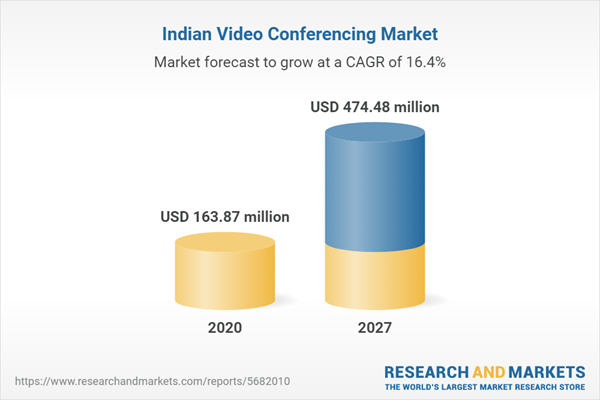The Indian video conferencing market is projected to grow significantly during the next five years. Integration of video communication services and solutions with the advanced, novel, and innovative technologies such as artificial intelligence, the Internet of Things, and cloud-based solutions and technology is expected to drive market growth in the coming years. The growing percentage of internet users in India's cities and villages is projected to hasten the country's acceptance of video conferencing technologies. According to a survey released by the Wireless and Cellular Association of India in November 2019, rural India had roughly 227 million mobile internet users, comparing to 205 million in urban India. The growth is also expected to surge because of the lower prices of internet connections in the country, as compared to global prices. In April 2020, the Government of India announced an innovation challenge, intending to develop a video conferencing app. The government of India's focus is to develop a local and an Indian-based app for its users.
Companies have been investing a significant sum of capital in developing novel technologies for the market. There has been a surge in the growth in the number of startups in the country. For Instance, In December 2020, BenQ, a major Taiwanese player in the market, launched a novel range of video conferencing cameras in India to support the hybrid workspace reality. The company stated that the novel series helped create an interactive and immersive conferencing experience for different types of workplace scenarios. Other companies have also been making substantial developments. In June 2020, Skyislimit Technologies Pvt. Ltd., an Indian-based company, launched a novel video conference platform called "Fokuz." This service aims to enable and provide a seamless experience in virtual interactions.
The COVID-19 pandemic has drastically touched every sphere of the economy. It has transformed the existing working style in the Indian sub-continent as the government has temporarily closed all forms of industry, ranging from manufacturing to educational institutions, effort to stop the COVID-19 epidemic from spreading. As a result, the way of employment has changed dramatically, with the distinctive rise of the remote working format in the country. Even in the education sector, teaching is undertaken remotely and on digital platforms. In addition, favourable government initiative toward adopting online education platforms is anticipated to propel growth opportunities in the coming years. For instance, recently, the Ministry of Human Resource Development (HRD) shared various free digital e-Learning platforms that students capitalize on to continue learning during COVID-19-based school closures. Besides, due to the pandemic, video conferencing has been widely adopted in all forms of industry as a platform of interaction after the restriction on social gatherings and work-from-home measures were lifted in the country. Many new players have also entered the market to tap the growing market for such platforms; for instance, in July 2020, Reliance Jio Infocomm Ltd launched its video conferencing service JioMeet which would be free to use after it arrived in the market. Airtel also launched the video conferencing app BlueJeans in July to compete with the existing rivals in the industry. Furthermore, domestic players are raising capital to engage in the ongoing competition in the video conferencing industry, which is a sign of the stable and high growth potential of the domestic market. For instance, in September 2020, Kochi-based Skyislimit Technologies, video-conferencing platform Fokuz, had a US$2 million angel investment from a US-based healthcare and manufacturing company.
Key Development
- Zoom Video Communications, Inc. teamed up alongside Amazon Web Services (AWS) Marketplace in September 2021 to offer video conferencing services to state, federal, and municipal government clients.
- Microsoft Corporation teamed up with SAP SE in January 2021 to deliver new connectors for SAP Microsoft Team products such as SAP SuccessFactors, SAP S/4HANA, and SAP Consumer Experience.
Impact of COVID-19
The sector has a positive impact from COVID's growing influence. Even as businesses transition to digital models and operate remotely, data consumption keeps rising, necessitating the creation of a connectivity-centric ecosystem. Telecommunications companies have also begun to invest in private networks in order to minimize congestion issues and improve service quality. The software industry has reaped the benefits of COVID's growing influence. Due to the imposition of a comprehensive national lockdown in the country to limit the effects of the Coronavirus, a lot of firms adopted work-from-home strategies, which has boosted the market value of video conferencing solutions, as a business relies on video conferencing platforms to sustain quick and efficient conferences with employees from the comfort of their own homes.SEGMENTATION:
By Offering
- Hardware
- Software
- Cloud
- On-Premise
- Service
By Firm Size
- Small
- Medium
- Large
By End-User
- Education
- Healthcare
- Government
- BFSI
- IT and Telecom
By Cities
- New Delhi
- Mumbai
- Bengaluru
- Chennai
Table of Contents
Companies Mentioned
- Cisco Systems, Inc.
- Zoho Corporation Pvt. Ltd
- Zoom Video Communications, Inc.
- Verizon
- Microsoft Corporation
Table Information
| Report Attribute | Details |
|---|---|
| No. of Pages | 88 |
| Published | September 2022 |
| Forecast Period | 2020 - 2027 |
| Estimated Market Value ( USD | $ 163.87 million |
| Forecasted Market Value ( USD | $ 474.48 million |
| Compound Annual Growth Rate | 16.4% |
| Regions Covered | India |
| No. of Companies Mentioned | 6 |









